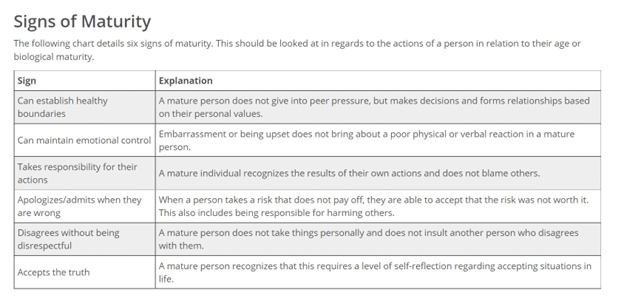Thanksgiving this year, by design, was a quiet time of mealtimes, movies, and conversation. During conversation, my daughter mentioned that her now full adulting was sure not what it appeared to be from a young adult, high school, and college-days perspective. She expressed she wished we had shared directly with her more of the challenges we faced and the choices we made and what we were like in our twenties so she could be better prepared. All my husband and I could say at that point was we understood her pain, and I shared I wished I knew at twenty-five what I knew at thirty-five, and at thirty-five what I knew at forty-five, and, yes, looking back, forty-five looks pretty messed up if I compare it to me now at fifty-five, yet it was those experiences that got me to where I am right now. That moment, when she was truly distraught, hit home with Pastor’s comment the previous Sunday that “we as parents are only as happy as our saddest child,” as stepping back into parent mode was my first thought to ease all of our emotional pain. My maturity knew that nothing but her own realization in the moment that she “got what she wished for” would move her to full adult mode from adolescent adult mode, and my faith in God above that he has the perfect plan for her allowed me to trust she would figure it out on her own without us diminishing in our own walk of maturity.
The conversational moment she had before her now offered her an opportunity to accept us for what we did or did not do to prepare her, and if she wanted to know something specific, ask us. My husband added his reminder to look more out the larger front windshield than the rearview mirror. The rest of the day went relationally well, other than my husband and I wanting to coddle her and having to hold each other accountable in our weak moments of thoughts of hastening. Adult life requires us to “know what we don’t know” and be okay with right where we are and develop forward thinking, a mind-set of one invested in the future.
Homeplace, workplace, or anyplace, acceptance of your choices to date (good or bad) and the ability to forgive yourself and others for what you wished they did or did not do for you clears your vision for better opportunities in the future. Similar to how young adults set expectations of their parents, in the workplace, professionals of all ages tend to extend dissatisfaction with what was communicated by their superiors or peers when they are looking to justify, soothe, or differentiate their own choices or lack of direction when displeased or seeking to elevate their own standings.
The app and site Study.com has a lesson called Maturity—Biological, Mental and Emotional. The lesson contributors Skidmore, Gray, and Chapel focus on psychological maturity, explaining the difference between mental and emotional maturity. They include an opening explanation and helpful chart below demonstrating how six signs of adult maturity might look.

Prior to logging on to purchase the study, they close with “in its simplest form, maturity is the ability to respond to a given situation appropriately.”
They state that adolescents/young adults from ages 13 to mid-20s are spending more time with friends and reflecting on who they are and what they want to do in life up until that point. They categorize the next stage as approximately the mid-20s until one’s children become adolescents. They say that adults show emotional maturity by adapting to their lives and multitasking (the ability to handle things from different realms of their lives at once).
The contributors to the study state, “Adults also look to have satisfaction in their careers and family relationships. This will include building on care and nurturing, as people at this stage show concern to grow and pass on values to the next generation or by growing through professional networking.”
What are three things you can add to your everyday life to develop the maturity to carry into the workplace with you daily, improving your interactions at work and your career itself?
1. Reflection—Set aside quiet time daily for serious thought and consideration. This may be difficult at first because of the voices in your head and distractions. Discipline in scheduling a time of day that can be consistent for looking within and looking above will help you mature on the inside and not just superficially.
“Reflection is one of the most underused yet powerful tools for success.”
2. Rejection—Reject the louder voice that may be trying to discourage or disparage you. I learned this from many people more mature than I over the years and shared with my children that if the thought is negative (unpleasing), “you have another thought coming,” so reject it and take on the new (true, noble, right, pure, lovely, admirable, excellent, or praiseworthy) thought as only those exceptional thoughts are for you!
“Fill your mind with good thoughts and there won’t be any room for the bad ones.”
— Joyce Meyer
3. Retrospection – Quickly looking back and considering the past but not to staying there for too long, apart from for what we might do differently next time if offered the chance can be a good thing. When learning to drive they tell you to look back with the three second rule to be able to adjust if what is behind you might be negatively encroach what is on the road before you. Under retrospect in the dictionary it says “once retrospective is behind you, add retrospect to what is before you.” Retrospect as it refers to reconsideration of how we might behave differently or accept circumstances next time.
“One day, in retrospect, the years of struggle will strike you as the most beautiful.”
— Joyce Meyer
Biological maturity for adulthood starts at 13. Seemingly, the biggest difference in going from young adulting to mature adulting is taking responsibility for your own choices and how they affect others around you. Mental and emotional maturity start when, despite hearing another’s story, you are just fine with how yours is playing out because you know tomorrow brings you a new chance on life. That chance for you is today whether or not you like my forewarning. What will you do with it?
Happy Adulting,
Suzanne Breistol




